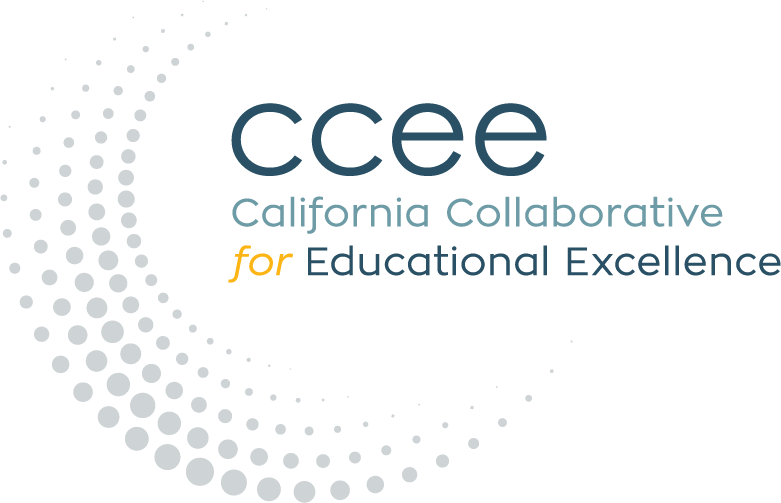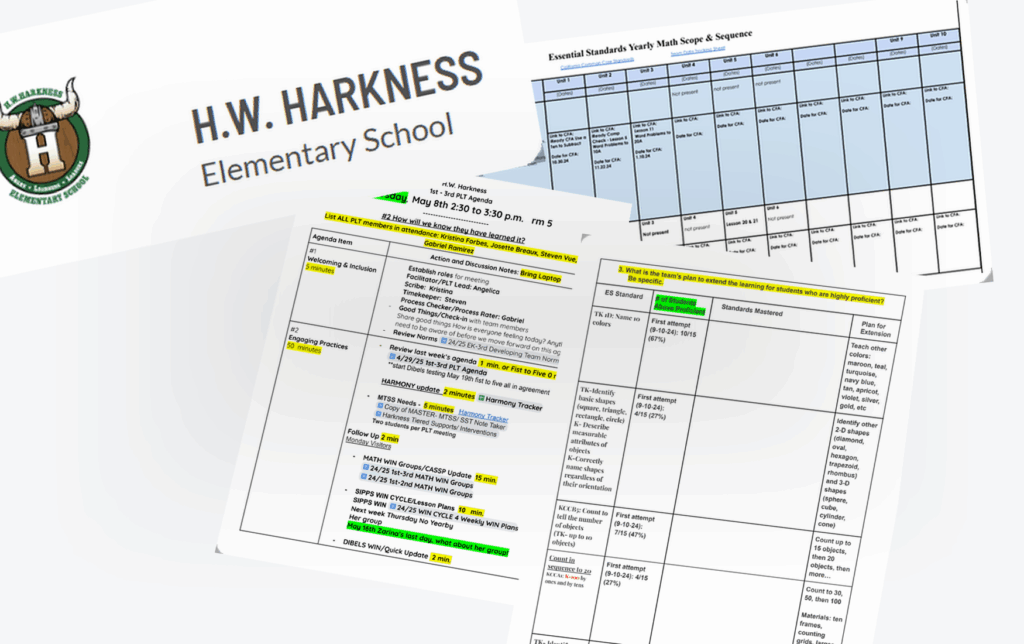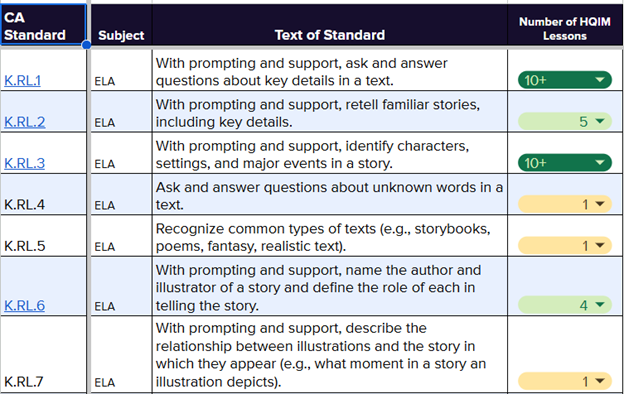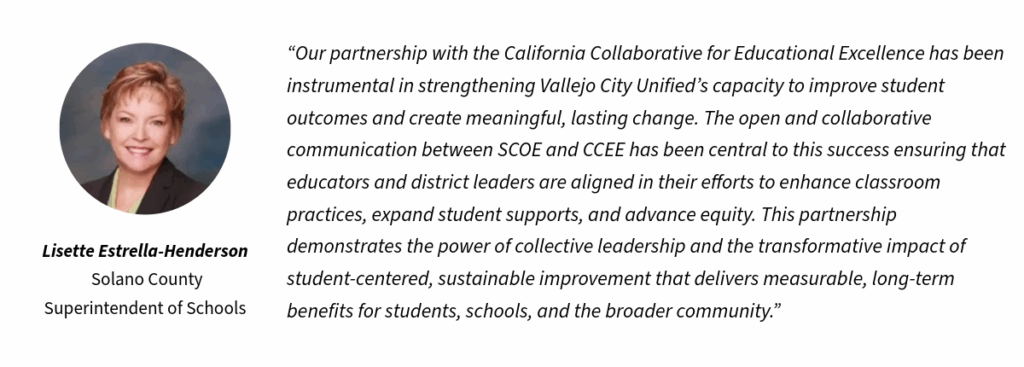The conversation around pandemic recovery in education has shifted. We’ve moved past the initial frustration of learning loss and entered a more demanding phase: the new normal of sustained, evidence-based intervention that supports the whole child and produces measurable academic improvement. CCEE launched its Intensive Assistance Model (IAM) in 2022–23 to help district and school-site leaders and teacher teams navigate today’s instructional complexity through proven practices that strengthen rigor, coherence, and consistency with a clear focus on improving teaching and learning.
The Architecture of Effective Support
What distinguishes IAM from typical technical assistance is its structural design. The partnership framework connects CCEE, school districts, County Offices of Education, and Solution Tree’s PLC at Work® process through certified associates who provide intensive onsite support rather than periodic consultations. This matters because the gap between knowing what works and implementing what works is where most improvement efforts fail. Teachers attend professional development, return to their classrooms, and gradually revert to previous practices, not from lack of will, but from lack of embedded support. The IAM model addresses this by situating expert coaches within schools for extended engagements, ensuring that the collaborative structures essential to PLC work don’t collapse under the pressure of daily demands.
The hard work of H. W. Harkness Elementary School in partnership with Sacramento City Unified School District was recently recognized with the California Promising School designation. This honor reflects meaningful progress in implementing PLC at Work® and marks an important milestone on the path toward becoming a Model PLC at Work school. Promising Practices schools demonstrate a strong foundation for high-functioning professional learning communities and provide at least one year of evidence showing growth in student achievement.
Lessons from Sacramento Unified’s Implementation
Harkness Elementary in Sacramento Unified School District provides a detailed case study of IAM implementation with three dimensions of their work providing insight for educators considering similar approaches.
Monitoring with Intentional Frequency
The school’s approach to monitoring student learning demonstrates how granular attention to assessment yields actionable data. Their sequence begins with Essential Standards selection from California State Standards, followed by unpacking those standards into student-friendly “I CAN” statements that serve both student understanding and teacher clarity about learning targets. The daily informal assessments (exit tickets, fist of five, thumb signals, punch cards) create continuous feedback loops that inform immediate instructional adjustments, while unit assessments and Common Formative Assessments (CFAs) provide structured checkpoints.
The critical detail here is the 80% mastery threshold applied to CFAs combined with the commitment that this includes small-group reteaching until the class reaches that benchmark. This isn’t assessment for reporting purposes; it’s assessment structured to guarantee intervention for every student on essential standards. Weekly PLT meetings where teacher teams review data and determine action steps complete the cycle, ensuring that data doesn’t accumulate without response.
Intervention Systems That Protect Core Instruction
Harkness’s Multi-Tiered Systems of Support implementation offers a masterclass in scheduling intervention without sacrificing foundational instruction. Their MTSS team structure includes clear referral processes for academic, attendance, and social-emotional needs, with systematic goal-setting and action planning. The Tier 2 interventions following CFAs, where teachers pull small groups or exchange students across classrooms, demonstrate flexible response to immediate learning gaps.
The WIN (“What I Need”) time structure for reading intervention exemplifies data-driven grouping. Students are placed based on beginning-of-year SIPPS, i-Ready, and DIBELS assessments, with fluid grouping that responds to changing needs. When midyear DIBELS data revealed students requiring additional support for gap-closing growth, the school added a 15-minute Tier 3 intervention at day’s end for foundational skill review. This responsiveness emerged directly from PLC meeting analysis, illustrating how the collaborative structure generates solutions.
The English Language Development provisions demonstrate attention to specific population needs: 30-minute pull-out intensive instruction for Level 1 Newcomers, and designated ELD instruction for Levels 2 and 3 within classroom settings. The Harmony curriculum integration for social-emotional learning, including “Meet Up” and “Buddy Up” routines plus 10-week Harmony Groups for students needing targeted SEL support, rounds out a comprehensive intervention architecture.
Perhaps most significantly, Harkness explicitly notes that their master schedule reflects their priorities: students are not pulled for intervention at the expense of Tier 1 instruction. This scheduling discipline is often where intervention systems compromise themselves.
Building Collaborative Capacity
The teacher capacity-building work at Harkness reveals how professional learning communities function when implemented with fidelity. Weekly after-school team meetings organized by grade band (K-3 and 4-6, with TK-K breaking off as needed) run on SMART goals: Specific, Measurable, Attainable, Results-Focused, and Time-Bound. The meeting structure itself models efficient collaboration: five minutes for “Good Things” sharing to build community, 45 minutes addressing one or more of the four PLC questions, and a final ten minutes for action items, next meeting agenda, and closure.
The agendas are shared and editable by team members, enabling collective ownership of meeting direction. Combined with 2-4 professional development sessions monthly with Solution Tree trainers and structured peer observation opportunities, this creates multiple channels for professional growth within a coherent framework.
Resources for Deeper Exploration
The following Promising Practice documents from Harkness Elementary’s implementation provide concrete examples that educators can examine for adaptation in their own contexts:
- Milestone Assessments and Scope & Sequence Documents – Illustrate the alignment between Essential Standards selection and curriculum pacing
- Essential Standards (ELA) School-Wide Document – Shows vertical alignment approach across grade levels
- Culturally Responsive Walkthrough Tool – Demonstrates integration of equity lens with instructional observation
- Master Schedule – Reveals how intervention time is protected while maintaining instructional priorities
- WIN/SIPPS Groups with Data – Provides model for data-driven intervention grouping
- MTSS Referral and Note-Taking Templates – Offers replicable structures for systematic intervention management
- PLT Agendas and Goal Documents – Models effective meeting structure and SMART goal integration
- Professional Learning Calendar – Shows how ongoing development is scheduled and sustained
For additional updates, visit the CCEE website, events calendar, Resource Center, and the Statewide System of Support Website.




